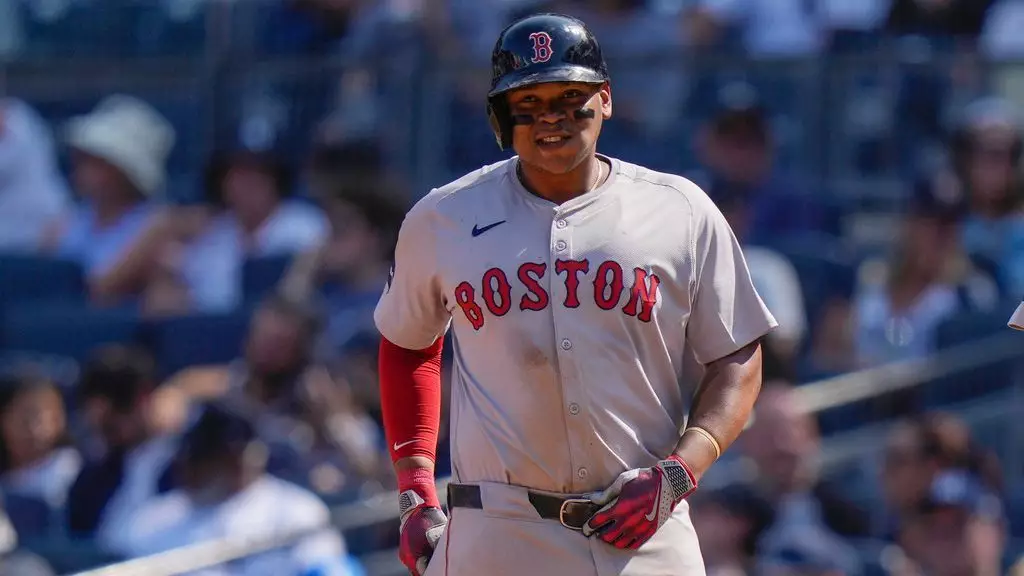The world of baseball is fraught with upheaval, especially when it comes to player positions. Witness the recent situation involving Rafael Devers, the powerhouse designated hitter for the Boston Red Sox. Following an injury to first baseman Triston Casas, management approached Devers about the possibility of switching positions once again. After having made the challenging transition from third base to designated hitter earlier in the season, one can understand Devers’ reluctance to don a new glove. This situation not only raises questions about player versatility but also underscores the importance of clear communication between a player and his management.
Devers, a three-time All-Star, vehemently asserts his commitment to his current role. His focus is singular: to lead the Red Sox in hitting without the added burdens of adapting to a position he hasn’t played in the major leagues. Baseball is not merely a game of physical prowess; it deeply involves mental adjustments and confidence in one’s assigned role. By prioritizing his position as the designated hitter, Devers is standing firm on what has already been a difficult path. The idea of switching back, especially in response to an unforeseen circumstance, is laden with potential pitfalls.
A History of Position Changes
Position changes can dramatically impact a player’s performance. In Devers’ case, his transition from third base was initiated when the Red Sox acquired Alex Bregman, a move that thrust Devers into the DH role. While the flexibility to adapt is certainly valued in the world of sports, it should not come at the expense of a player’s established rhythm and success. Devers has expressed a feeling of betrayal; he feels the front office made promises about his role that have now come into question. Changes like this can undermine both confidence and performance.
In an interview, Devers articulated his frustration, stating, “They can’t expect me to play every single position out there.” He firmly believes that asking him to fill in at first base after establishing himself as a designated hitter would disrupt not just his game but the overall balance of the team. Therefore, one has to ask why the Red Sox would consider such a maneuver. It’s fair to question whether management’s expectations are grounded in reality or simply a reaction to immediate problems on the field.
The Role of Communication in Team Dynamics
Team dynamics depend largely on the relationship between players and management. Devers’ exchange with Craig Breslow emphasizes the importance of clear communication about roles and expectations. Devers pointed out that Breslow, with years of experience in baseball, should intuitively understand that changing positions isn’t trivial. This illustrates a broader issue in sports management: the necessity of engaging players in meaningful dialogue about their roles and the implications of sudden changes.
Devers suggests a proactive approach from the front office, recommending they scout for alternative players rather than expecting him to fill a gap he’s unprepared for. It’s a valid argument that reinforces the importance of strategic planning in roster management—especially in a high-stakes environment like Major League Baseball. The Red Sox have the resources to seek outside talent rather than putting pressure on their star hitter to fill an unfamiliar position.
Preserving Talent and Unleashing Potential
Ultimately, preserving Devers’ talent as a designated hitter is not just about one player; it’s about the broader impact his performance has on the rest of the team. Engaging someone who has yet to play in a position while simultaneously asking them to adapt generates considerable uncertainty. If Devers’ production diminishes due to these upheavals, it could ultimately harm the team’s chances at post-season glory.
Baseball is a complex game that requires each player to excel in their designated roles. Rafael Devers is making it clear that he intends to focus on being the best DH he can be, insisting that management keep their promises. By advocating for consistency and clarity in his role, Devers is sending a crucial message: success in baseball relies on nurtured talent rather than forced experimentation. This commitment to his position not only highlights Devers’ resolve but also serves as a stark reminder of the importance of respecting the player’s expertise and instincts in a sport that thrives on both strategy and skill.


Leave a Reply